|
|
|
Sort Order |
|
|
|
Items / Page
|
|
|
|
|
|
|
| Srl | Item |
| 1 |
ID:
168833
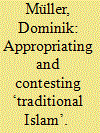

|
|
|
|
|
| Summary/Abstract |
Based on an ethnographic case study of an Islamic university in Russia, I examine how the state-implemented and bureaucratized traditionalization of Islam in Russia affects the everyday life of Central Asian students and how this project ‘from above’ is entangled with their coping strategies. I show how religious education has become a resource for the state as well as for young students and their parents. The Russian state uses these official religious institutions to control the Muslim population by creating and promoting a state-approved version of ‘traditional Islam’ and producing official religious specialists. For the young Muslim students, however, Islamic education provides, in addition to religious knowledge, access to networks, social security and new economic opportunities. It thereby offers a way to cope with the uncertainty caused by high unemployment rates and other socio-economic difficulties among young people.
|
|
|
|
|
|
|
|
|
|
|
|
|
|
|
|
| 2 |
ID:
153680
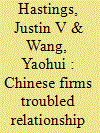

|
|
|
|
|
| Summary/Abstract |
The coping strategies that small Chinese firms operating in North Korea have chosen involve insinuating themselves into North Korean political and social networks, and structuring their investments so as to minimize their exposure to North Korean infrastructure, workers, and institutions. As a result, it is unlikely that Chinese firms will be the main drivers of market transformation in North Korea.
|
|
|
|
|
|
|
|
|
|
|
|
|
|
|
|
| 3 |
ID:
115629
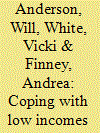

|
|
|
|
|
| Publication |
2012.
|
| Summary/Abstract |
This paper presents findings from a study of low-income households in Great Britain which explored households' strategies for coping both with limited financial resources in the winter months, when demand for domestic energy increases, and, in some cases, with cold homes. The study combined a national survey of 699 households with an income below 60 per cent of national median income with in-depth interviews with a subsample of 50 households. The primary strategy adopted by low-income households to cope with financial constraint was to reduce spending, including spending on essentials such as food and fuel, and thereby keep up with core financial commitments. While spending on food was usually reduced by cutting the range and quality of food purchased, spending on energy was usually reduced by cutting consumption. Sixty-three per cent of low-income households had cut their energy consumption in the previous winter and 47 per cent had experienced cold homes. Improvements to the thermal performance of homes reduced but did not eliminate the risk of going cold as any heating cost could be a burden to households on the lowest incomes. Householders' attitudes were central to their coping strategies, with most expressing a determination to 'get by' come what may.
|
|
|
|
|
|
|
|
|
|
|
|
|
|
|
|
| 4 |
ID:
173770
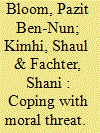

|
|
|
|
|
| Summary/Abstract |
Moral dilemmas amid war on terrorism include repeated harsh moral choices, which often pose threats to one’s moral image. Given that people strive to view themselves as moral, how do they cope with such morally compromising decisions? We suggest and test two strategies to cope with morally threatening decision-making under in-group moral responsibility amid war on terrorism: (a) trivialization of the moral dilemma and (b) resentment toward the target. Four experimental studies measured (study 1) and manipulated (studies 2–4) these hypothesized mechanisms, presenting a similar collateral damage dilemma to Israeli Jews in the context of the 2014 Gaza conflict (studies 1 and 2) and to Americans in the context of the US campaign against Islamic State of Iraq and Syria (ISIS) (studies 3 and 4). Results demonstrate that both trivialization and resentment facilitate harsh moral choices under conditions of moral accountability. Studying the mechanism underlying moral decision-making in conflicts is key to understanding moral injury and the process of moral repair.
|
|
|
|
|
|
|
|
|
|
|
|
|
|
|
|
| 5 |
ID:
177004
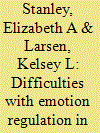

|
|
|
|
|
| Summary/Abstract |
The ability to regulate negative emotions is especially necessary for service members in the contemporary U.S. armed forces, since they routinely face situations that elicit negative emotions while executing their professional roles. Yet difficulties with regulating emotions, which are associated with stress and mood disorders, suicidality, and impairments in work performance, remain prevalent across this group. This article surveys research in five domains—recruitment and selection effects, military cultural pressures and coping strategies, training, common chronic stressors, and the contemporary operational environment—to highlight structural contributors to the heavy stress loads that U.S. service members often bear, which may contribute to their difficulty with emotion regulation (ER). It concludes with several recommendations that the military could implement to mitigate service members’ stress loads and facilitate ER. Enhancing their ER skills may offer a long-term strategy to improve their resilience and performance.
|
|
|
|
|
|
|
|
|
|
|
|
|
|
|
|
| 6 |
ID:
149489
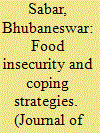

|
|
|
|
|
| Summary/Abstract |
This paper explores the food insecurity level and coping strategies of two particularly vulnerable tribal groups (PVTGs) in India. It finds that despite the availability of resources, limited income always becomes a proxy for their food vulnerability because they cannot purchase food items outside state programmes. These groups traditionally adopt various coping strategies to overcome food insecurity at household level and these have become a structure and behaviour for ensuring food security
|
|
|
|
|
|
|
|
|
|
|
|
|
|
|
|
| 7 |
ID:
162348
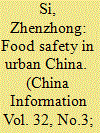

|
|
|
|
|
| Summary/Abstract |
Food safety has become an increasingly pressing sociopolitical issue in China due to the outbreak of food safety scandals since the 2000s. Existing studies have highlighted the socio-economic context of this issue, its drivers and implications. Yet, few studies have examined the perceptions of food safety conditions and strategies undertaken by consumers in their daily lives to cope with the challenge. Based on a city-wide survey of 1210 households and 36 interviews in Nanjing, China, this research adopts an ‘everyday’ perspective of analysis to investigate Nanjing residents’ perceptions of, and strategies to cope with, the food safety challenge. Perceptions include the severity of the food safety problem, the least safe foods, as well as causes and responsibilities. Coping strategies include various approaches to food access and food preparation. This article also compares the validity of potential sources of trust in food. On the one hand, the study demonstrates how the structural changes in China’s food system (i.e. chemical intensive food production and elongated food supply chains) constitute the major problems and causes of food safety issues. On the other hand, it reveals the considerable latitude within which Nanjing residents proactively exercise their agency when facing food safety challenges.
|
|
|
|
|
|
|
|
|
|
|
|
|
|
|
|
| 8 |
ID:
185139
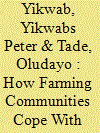

|
|
|
|
|
| Summary/Abstract |
A largely overlooked area in extant literature on farmer-herder conflict in Nigeria is coping strategies employed by internally displaced farming communities. Using exploratory design and qualitative data collection tools, we collected data from 23 purposively selected victims of farmer-herder conflict in Nasarawa State who were displaced and were either living in internally displaced persons camps or with friends/family. Findings showed that participants relied on their friends and family to cope with victimization experiences. Reported coping strategies included job switching, relocation to a safer place, formation of a vigilance group and trusting in God. The article recommends, among other things, empowering displaced populations with skills to cope with displacement challenges.
|
|
|
|
|
|
|
|
|
|
|
|
|
|
|
|
| 9 |
ID:
093696
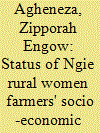

|
|
|
|
|
| Publication |
2009.
|
| Summary/Abstract |
The article examines Ngie women's socio-economic conditions and discusses the factors that brought about these unfavorable conditions. These unfavorable conditions are due to physical, cultural and human factors. Some recommendations are suggested. The results of this article represent a synthesis of interview data gathered from rural women farmers in Ngie villages through survey, group meetings of other villages, farm visits and participant observation. The conclusion is that the women must depend on the evolution of a productive system in which environmental management, social institutions, good administration, good income-generating activities and good agricultural practices are closely linked.
|
|
|
|
|
|
|
|
|
|
|
|
|
|
|
|
| 10 |
ID:
094142


|
|
|
|
|
| Publication |
2010.
|
| Summary/Abstract |
A survey of military wives (N = 77) identifies their most stressful experiences, self-appraised control over these stressors, and coping strategies used. The authors examine two competing hypotheses: the goodness-of-fit hypothesis that the effects of problem-focused coping (PFC) and emotion-focused coping (EFC) strategies on distress are moderated by the appraised controllability of the stressor, and the main-effects hypothesis that PFC strategies are more effective than EFC strategies in reducing distress regardless of appraisal of controllability. Wives identified deployment of soldiers as their most stressful experience, and reported using PFC strategies more frequently than EFC strategies. EFC strategies were predictive of greater physical symptoms of illness, while PFC strategies were related to reduced physical symptoms of illness only when military wives' perceived control of the situation was low. PFC strategies and controllability were significantly related to decreased depressive symptoms; EFC was marginally related to increased depressive symptoms, lending greater support to the main-effects hypothesis.
|
|
|
|
|
|
|
|
|
|
|
|
|
|
|
|
| 11 |
ID:
190799


|
|
|
|
|
| Summary/Abstract |
This paper discusses how different groups within Myanmar’s population respond to multiple crises caused by the 2021 military coup, the economic and social consequences of multiple waves of Covid-19 and increasing global food and fuel prices. It is based on monthly observation reports (MOR) by local researchers to focus on the range of actions taken by Myanmar’s silent accommodating majority. Contrary to conventional studies that treat “loyalty” and “passive resistance” as separate categories of individual or collective responses to government failures, this paper introduces “accommodation” as a strategy to reflect actions by those who have engaged in both compliance and passive resistance to deal with the military dictatorship in Myanmar. Those who practice accommodation strategies prioritize safety-first approaches that avoid open resistance to the military regime while simultaneously challenging its claim to legitimacy. Some of the strategies that undermine the military regime’s claim to legitimacy, however, such as the civil disobedience movement in education and healthcare, further deprive the state of the resource to serve the needs of the general population and thus have detrimental and long-term impacts on individuals who use these.
|
|
|
|
|
|
|
|
|
|
|
|
|
|
|
|
| 12 |
ID:
149598
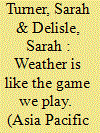

|
|
|
|
|
| Summary/Abstract |
The Vietnamese government, along with country-based non-government organisations, are well aware of the vulnerability of Vietnam's coastal and low-lying areas to extreme weather events. Yet scant attention has been paid to extreme weather hazards affecting Vietnam's northern mountainous regions and the livelihoods of ethnic minority farmers residing there. Building on conceptual tools from vulnerability, food security and sustainable livelihoods literatures, we examine the impacts of extreme weather, namely drought and severe cold spells, in Vietnam's northern uplands. We explore the degree to which these events impact the livelihood portfolios and food security of ethnic minority farmers, and examine the coping strategies households initiate, based on their ecological knowledge as well as recent market integration initiatives. Drawing on ethnographic fieldwork with ethnic minority Hmong and Yao semi-subsistence households undertaken yearly from 2012 to 2014, we demonstrate that financial capital – now more central to households' livelihoods than ever before due to state-sponsored agricultural intensification – is an important means for farmers to cope with extreme weather events. Yet concurrently, longstanding culturally rooted social capital, networks and ties remain critical. Nonetheless, short- and long-term adaptation is not widespread, leading us to investigate possible explanations.
|
|
|
|
|
|
|
|
|
|
|
|
|
|
|
|
|
|
|
|
|